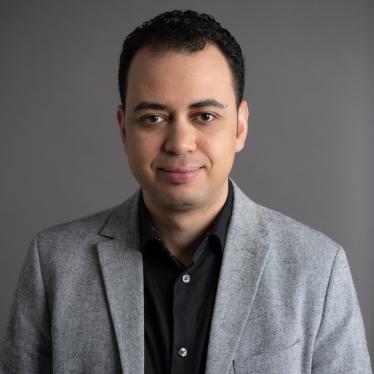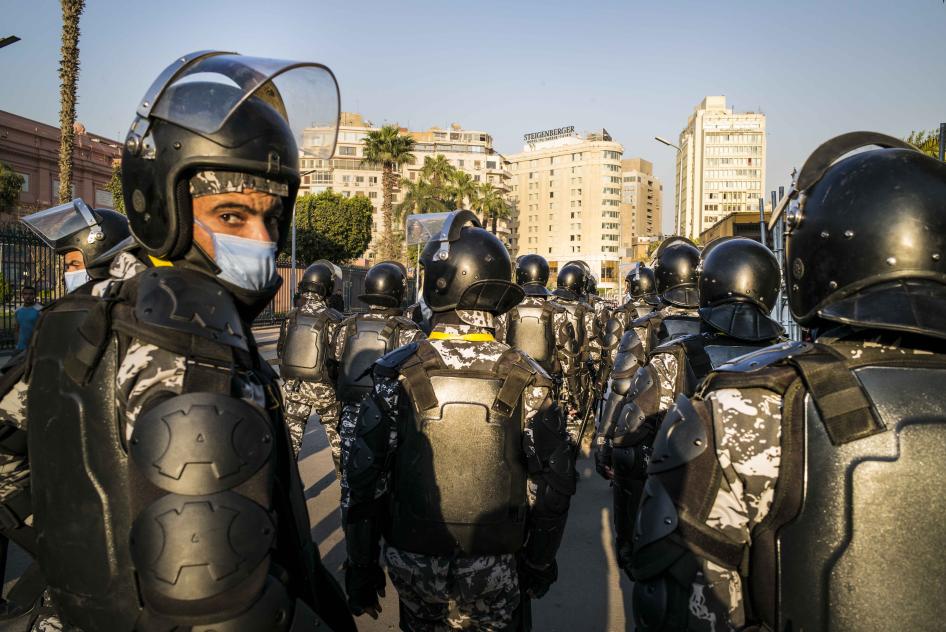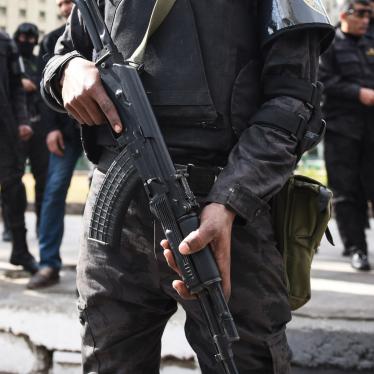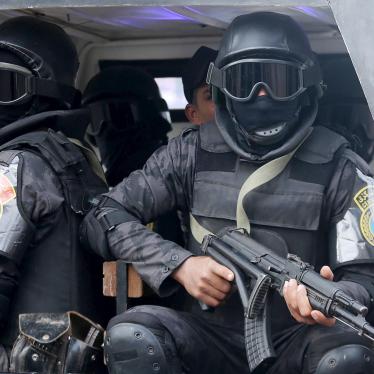Karim Assaad, a 30-year-old Egyptian journalist, stayed up late on August 18 to finish some work so he could enjoy the rest of the weekend with his wife and 2-year-old son. Before dawn’s light filled the skies in Cairo, Assaad heard aggressive knocks on their door. “We thought the building was collapsing,” his wife later said in a media interview.
As they ran to the door, they heard men’s voices ordering them to open the door or it would be broken down, a source close to the family told me. Ten heavily armed men, some of them in police uniforms, stormed in, insulting Assaad and his wife for not opening swiftly. They immediately announced the reasons for their visit. “You don’t know the consequences of what you’ve published,” a man told Assaad.
The men then locked Assaad’s wife in one room, slapped her in the face, and subjected her to a barrage of blows and insults — all in front of her toddler, who was bawling. They told her she would not see her child again if she did not answer their questions about her husband’s work. They ordered her to hand them all their cash and jewelry, laptops, and phones.
Meanwhile, others were questioning Assaad in another room for half an hour. Then they took him away.
In Sisi’s Egypt, Telling the Truth Is a Crime
These men were not an armed gang taking revenge on a journalist who reported on their illegal activity. They are government security agents who, as a source described, took Assaad to the General Intelligence Agency. Such thuggish behavior has been the norm under the rule of President Abdel Fattah al-Sisi.
Assaad is a journalist at Matsadaash (“Don’t Believe”), one of the first Arabic fact checking websites and open-source investigation platforms. Since 2018, it has gained the trust and following of millions of people by contributing rich content deconstructing online misinformation, as well as propaganda and lies by the government and opposition alike.
Al-Sisi’s agencies have controlled, purchased, or coerced all mainstream media in the country, and opposition media in exile is largely partisan. So web platforms like Matsadaash play a valuable role as one of the last remaining voices for independent information in the so-called “hashtag war,” a milieu of severe repression and rampant disinformation
Several days before the assault on Assaad, Matsadaash had unearthed important information about a mysterious private jet that authorities in Zambia had seized in early August after it arrived from Cairo loaded with millions of dollars, gold that might be fake, and guns and ammunition. The Zambian authorities arrested six Egyptians on board the jet before releasing them weeks later.
The Egyptian government tried to obscure the whole incident. But the work of brave, young professionals like Assaad exposed it by using open-source information to piece together the puzzle. Their reporting revealed that Egyptian military and police officers were among the six arrested and that the private jet was most likely used by government ministers in previous travels abroad.
In Sisi’s Egypt, truth-telling has long been criminalized. The raiding security agents forced Assaad to delete two Facebook posts about that private jet.
Fortunately, the authorities released Assaad two days after his arrest after a strong solidarity campaign and interventions by people who negotiated his release. The source told me that authorities had not anticipated the amount of coverage and solidarity Assaad’s arrest would ignite. He said that Assaad received humane treatment during his short detention, but the message had been delivered: Those who seek to exercise their basic rights in Egypt should expect to be punished.
The Massacre That Changed Egypt Forever
It is more than a coincidence that Assaad’s ordeal took place the same week as the 10th anniversary of the Rab’a mass killings, the massacre that changed Egypt forever.
On August 14, 2013, Egyptian police and military forces violently dispersed a largely peaceful sit-in protesting the military’s removal of Egypt’s first elected leader, Mohamed Morsy. They killed well over 800 people in a broad daylight attack that was thoroughly planned at the most senior levels.
Ten years later, those responsible have been promoted and rewarded — and the survivors have been imprisoned or exiled.
Assaad’s case is a stark reminder of what has gone wrong in Egypt. The government makes almost no effort to restrain the security forces or force them to act within the law. It’s clear to them that abuse is greenlighted in the name of “security.”
This doctrine has been echoed in numerous official statements, including by al-Sisi. Addressing a comment in June about unjustly held prisoners, al-Sisi angrily said that those arrests were about “rescuing the homeland.” Military commanders, and senior security and government officials claiming moral superiority have used the idea of “protecting” the “homeland” to justify mass murder in broad daylight.
Distorting boundaries is often a one-way ticket to a place where the rule of law, dignity, human rights, and basic morals quickly fall away. During the years after the Rab’a killings, security forces have been engaged in widespread, systematic abductions, enforced disappearances, torture, and extrajudicial killings — all in the name of ensuring the nation’s “security.”
Al-Sisi’s government first targeted Morsy’s Islamist supporters. But over the course of 10 years, security forces’ abuses have spared no perceived or actual critic in Egypt — even among those who had earlier supported the military coup. That continuum explains where Egypt is today.
In recent months, al-Sisi’s government has been engaged in a feverish public relations campaign to improve its sullied image, arguing that a national dialogue convened by al-Sisi and the release of some political prisoners represent a new beginning. In reality, the dialogue has largely devolved into a talkfest with minimal impact on repressive policies as thousands remain imprisoned and arbitrary arrests and abuses continue unabated.
Assaad’s abduction is a reminder that there can be no light at the end of the tunnel without addressing rampant security force abuses and lawlessness, including what happened in Rab’a 10 years ago.










